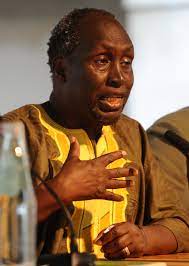Kenyan writer Ngũgĩ wa Thiong’o’s fable, ‘The Upright Revolution: Or Why Humans Walk Upright,’ made literary history when it became the single most translated short story in the history of African writing. My chapter reflects on that process, tracing the genesis of the story, to the earlier conceptual work that led to the publication of the translation issue by Jalada Africa and its post-publication popular and critical acclaim. Over 40 nations have been represented in the 92 translations so far published in platforms both online and in print. The synergy, coordination, as well as planning necessary to bring all these people together to work on a single project that revitalises our mother tongues speaks well to the dreams of visionaries like Ngũgĩ wa Thiong’o. From practical effects on the translation work of those involved, the cooperative efforts in the translation process and resultant global conversations, the Jalada translation project has challenged many orthodoxies and initiated conversations among languages. As the conceiver and editorial coordinator for the project, I examine the obstacles we had to overcome, and envision the future that is being paved by this work for the translation into and among African languages.

